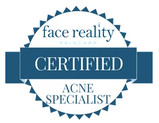What is a dermatologist?A dermatologist is a physician and surgeon trained in skin, hair, and nails — and in particular, the diagnosis, treatment and prevention of skin-related diseases. They are qualified to make diagnoses for medical conditions such as rosacea or psoriasis, and can prescribe oral or topical medications to treat those conditions. In some cases, they can also perform surgeries on skin abnormalities or growths that may be cancerous. What is an esthetician?While dermatologists often focus on the skin as a whole, estheticians are specially trained and place particular emphasis on the face. Also called a skin esthetician or skincare specialist, estheticians provide facial skincare services in a cosmetic or salon setting. (Curious about the difference between esthetician vs. aesthetician? While the terms sound similar, aesthetician refers to someone who performs medical skin procedures — like treating patients who have experienced facial skin damage because of chemotherapy, burns, surgery, or other health issues. That’s why you’ll often see aesthetician proceeded by the words “medical,” “paramedical,” or “clinical.”) Estheticians are not medical doctors, though they do undergo extensive professional training. Here in California, estheticians are held to particularly high standards: A certified (licensed) esthetician in the state will have completed 600 hours of training, a state-approved course/test, and a State Board Exam with written and practical components. What does an esthetician do?So, what does an esthetician actually do with all that training? A skin esthetician will usually start with a consultation and analysis of your skin, to better understand your skin type, lifestyle, and skincare goals. They’ll then develop a comprehensive skincare plan — which will usually include curated products and facials tailored to your needs. The best estheticians go even one step further to consult with you on how your diet and lifestyle impact skin health. When to see an esthetician vs. a dermatologist?While estheticians and dermatologists both exist to keep your skin as healthy as possible, they differ in a few important ways. Which one to see first depends on a few different variables, depending on what you’re looking for. Here are some factors to consider when deciding when to see an esthetician vs. a dermatologist. EnvironmentOne major difference between estheticians and dermatologists is where you would go to find them. Because dermatology is a medical profession, a dermatologist will usually practice in a medical office or other clinical setting. Estheticians often operate out of a spa or salon. Some people find a doctor’s office to be intimidating and impersonal, in which case a consult with an esthetician may be a better first step. Natural ApproachYou may also consider an esthetician over a dermatologist if you want to address skin concerns as naturally as possible. Many people are cautious about leaning too heavily on prescription medications, topical retinoids, or other medical interventions — and instead prefer products and treatments that use all-natural ingredients and methods. This is particularly true for those seeking help with anti-aging or acne treatments. BudgetUnfortunately, most health insurance companies consider this type of skincare to be cosmetic in nature, which means trips to a dermatologist’s office won’t be covered by your insurance plan. This can get costly when you’re paying out of pocket — especially with repeat visits, co-pays, and expensive procedures. If you’re on a budget, you may want to make a visit to your local esthetician to see if your skin can be treated without a hefty medical bill. Personal TouchIf you’ve been to a doctor’s office recently, you know how busy physicians are. They usually only have a few minutes to devote to each patient — which limits how in-depth each appointment can be, and how many follow up questions you’re able to ask. A consultation with a skin esthetician can be more exploratory in nature — discussing lifestyle, skincare goals, and what products you’re currently using — which could be another case for an esthetician vs. a dermatologist. Severity of Skincare NeedWith all this in mind, it’s still important to remember that an esthetician is not a doctor. If you have a growing rash or a worrisome mole, your esthetician can’t help with diagnosis, or prescribe medications to treat it. However, if your skin problem has already been diagnosed, your esthetician can suggest skin care products that are appropriate for you. RelationshipPerhaps the biggest benefit to working with an esthetician is the ongoing relationship it creates. At Simply Skin, I see most of my clients monthly — which means I’m attuned to their skin profile and can spot changes or irregularities on their skin quickly. If something looks concerning, I will refer them to a dermatologist — in many cases initiating a doctor visit that wouldn’t have happened otherwise. Working with an esthetician is a great way to benefit from an ongoing skincare partner. When to see an esthetician vs. a dermatologist?Both estheticians and dermatologists play an important role in your overall skin health — so your first step depends on what you’re ultimately looking for in the experience.
Visit a dermatologist when you’re due for a full-body scan (to check for skin cancer and other abnormalities), or if you suspect you have a skin disease. But if you've ever wondered about your skin type, are hoping to treat facial imperfections, or want advice for a holistic skincare regimen, visit your local skin esthetician. Make sure to do your homework, and work with a professional who is licensed and has experience with skin like yours. Ready to put your best face forward? Learn more about my holistic approach to skincare wellness by scheduling a consultation today.
0 Comments
Your comment will be posted after it is approved.
Leave a Reply. |



